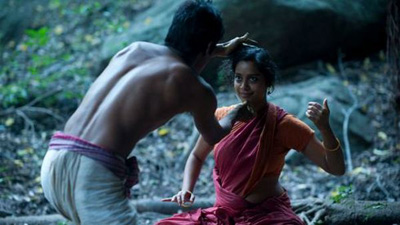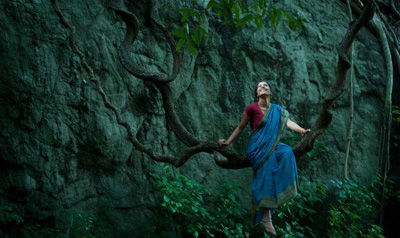A Conversation With Khyentse Norbu (VARA: A BLESSING)
A movie I did is premiering at Tribeca Film Festival this year. [Editor’s note: it’s called Glass Chin, and it’s awesome.] When I heard that Khyentse Norbu’s new movie, Vara: A Blessing, was going to be playing at the festival, I asked Tribeca if I could do a written interview with the filmmaking Rinpoche—send him some questions, waste his time a little. Tribeca set it up, and the following is basically him making my thoughts/ideas/questions seem very silly—which I’m grateful for.
Hammer to Nail: In Hollywood, some people, like the actor Leonardo DiCaprio, say that “film is forever.” What do you think of that idea—film is forever? Movies are forever? Isn’t film just as impermanent as everything else?
Khyentse Norbu: I actually don’t know what that means. In my brainwashed mind there is nothing that is forever.
H2N: The writer and zen master Peter Matthiessen has said that sometimes during meditation he has used the meditation time to get into a story he was working on. Does that ever happen with you? You’ll be meditating and end up thinking about a movie idea you have?
 KN: Of course. When we try to meditate and we try to concentrate, that’s the time when distraction comes. But that should not be the purpose of meditation. If you are a serious meditator, even if an amazing idea pops in, you should not even attempt to write it down. It should be considered as a curse and not as a blessing. But if your meditation purpose is not 100% spiritual, I guess you can use that time. I can see people can actually just do that: Meditate, so that one will have clearer ideas.
KN: Of course. When we try to meditate and we try to concentrate, that’s the time when distraction comes. But that should not be the purpose of meditation. If you are a serious meditator, even if an amazing idea pops in, you should not even attempt to write it down. It should be considered as a curse and not as a blessing. But if your meditation purpose is not 100% spiritual, I guess you can use that time. I can see people can actually just do that: Meditate, so that one will have clearer ideas.
H2N: In order to make a movie where you have a character suffering—for instance, the jealous older man in Travellers and Magicians—do you have to suffer as an artist in order to bring that character to life? Would that be Bodhisattva activity? Willingly going into suffering in order to illuminate suffering?
KN: I guess it can be. But it’s so difficult to be in someone else’s shoes. Jealousy has thousands and thousands of hues and shades. But as a human being there is no shortage of suffering, so I’m not that worried that I will not suffer.
H2N: If in ultimate reality we have no self, self being an ego delusion created by negative karma, if reality is emptiness—is art necessary? Or is simply sitting meditation in a cave the complete expression of emptiness?
KN: It is not a question of whether art is necessary or not. Necessary becomes necessary when you have a goal. If the goal is to free ourselves from entanglement, anxiety, pain, hope, fear, then it is necessary to deconstruct and dismantle those emotions and this can be done through techniques such as meditation. There is no reason why we cannot dismantle through art also.
H2N: I’ve heard you’re a fan of Yasujiro Ozu’s films? What is it about Ozu’s work that you admire?
Because Ozu makes me realize that even a simple event can be dramatic. I guess overall I admire the simplicity of his stories, his art of story telling and even the camera placement, but really the simplicity is the power.
H2N: We live in a world where things are being recorded more and more. People have video cameras on their cell phones now. There is a compulsion to record everything. Do you have any mixed feelings about making movies and thereby endorsing this recording obsession going on?
 KN: One kind of obsession or another is going to be there all the time. If not this, something else. I have no particular animosity toward recording. If only we could record the moment by moment discursive thoughts that we have, that would be good. But I don’t think anybody will be interested in that.
KN: One kind of obsession or another is going to be there all the time. If not this, something else. I have no particular animosity toward recording. If only we could record the moment by moment discursive thoughts that we have, that would be good. But I don’t think anybody will be interested in that.
H2N: I remember coming back from meditating in Nepal and watching Terrence Malick’s The Thin Red Line, a movie I had loved on previous viewings. But now all I could see in The Thin Red Line were a bunch of actors in a field, wearing costumes, and being filmed by a camera. The whole thing seemed totally absurd. Does this happen to you sometimes while watching movies? Even supposedly great movies?
KN: I think generally it depends on hope and expectation, how it comes, how much of it, and the timing of the hope and expectation that really interprets everything. Like you, Terrence Malick’s The Tree of Life, somebody has to tell me why it is considered a great film.
H2N: I have not met many artists who also have mature meditation practices. Both art and meditation are so demanding, it’s difficult for some of us to do both. Do you have any advice on how to balance art and spiritual practice?
I think spiritual practice for me is very much based on motivation. Art is just a tool, like a typewriter. With the right motivation, art may be able to benefit others in one sense.
H2N: The movie industry is full of hungry ghosts—how do you have compassion with all the hungry ghosts while also protecting your work? Can you be nice to everyone all the time without compromising your vision? Or are you sometimes like Manjushri, with the flaming sword, and use the sword to cut through all the delusion?
That’s a strange question. I guess I should learn how to feed these hungry ghosts and figure out how much I should let them stay hungry so that I can get my way.
H2N: How do you know when making art is compassionate versus selfish ego indulgence?
KN: Not only that, how do I know doing meditation is compassionate versus selfish ego indulgence.
— Noah Buschel











